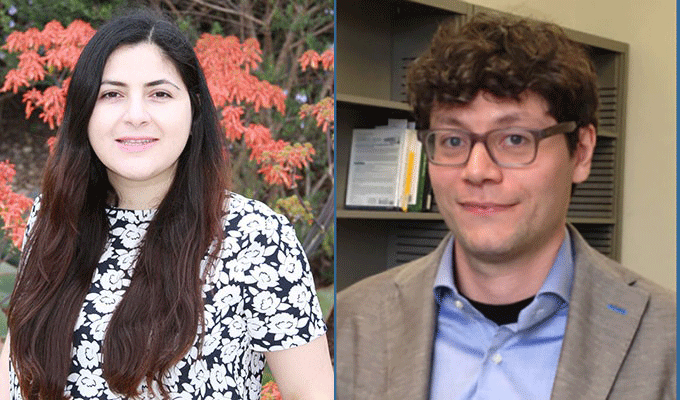Collaboration Will Develop Smart Mobile Sensor Network
 Oct. 18, 2017 - A mechanical and aerospace engineering professor has teamed with a computer science expert to devise a cognitive monitoring system for urban environments. UC Irvine assistant professors Solmaz Kia, MAE, and Marco Levorato, computer science with a joint appointment in the Samueli School, have won a three-year, $500,000 NSF award to develop a network of smart mobile sensors.
Oct. 18, 2017 - A mechanical and aerospace engineering professor has teamed with a computer science expert to devise a cognitive monitoring system for urban environments. UC Irvine assistant professors Solmaz Kia, MAE, and Marco Levorato, computer science with a joint appointment in the Samueli School, have won a three-year, $500,000 NSF award to develop a network of smart mobile sensors.
As urban populations grow, the need increases for technology to make city systems more effective and efficient. Developing these systems – which include intelligent transportation, and vehicular and security networks – requires overcoming several challenges: financial, network availability and coexistence with other services using the same resources.
Kia and Levorato will develop an urban, Internet of Things-based monitoring architecture for smart cities. Their proposed system will incorporate mobile drones and sensors that operate cooperatively with layered citywide networking and computation infrastructures. This allows for joint optimization of distributed data acquisition, transportation, processing and drone navigation. The project leverages recent IoT architectures and introduces a new notion of architecture-level intelligence for mobile sensor networks that includes real-time feedback capabilities.
The project also includes education, mentoring and outreach components that will help train the next generation of IoT systems designers.
“This is an exciting multidisciplinary project that brings together Marco’s expertise in IoT architectures, distributed learning and processing for efficient data acquisition with my expertise in mobile agent navigation,” said Kia. “We will devise effective solutions for real-time IoT data collection and processing applications, and provide an opportunity for engineering and computer science undergraduates to work alongside graduate students in an exciting collaborative environment.”
- Anna Lynn Spitzer
